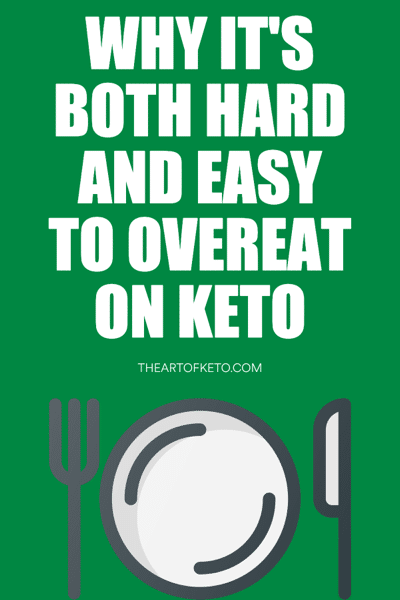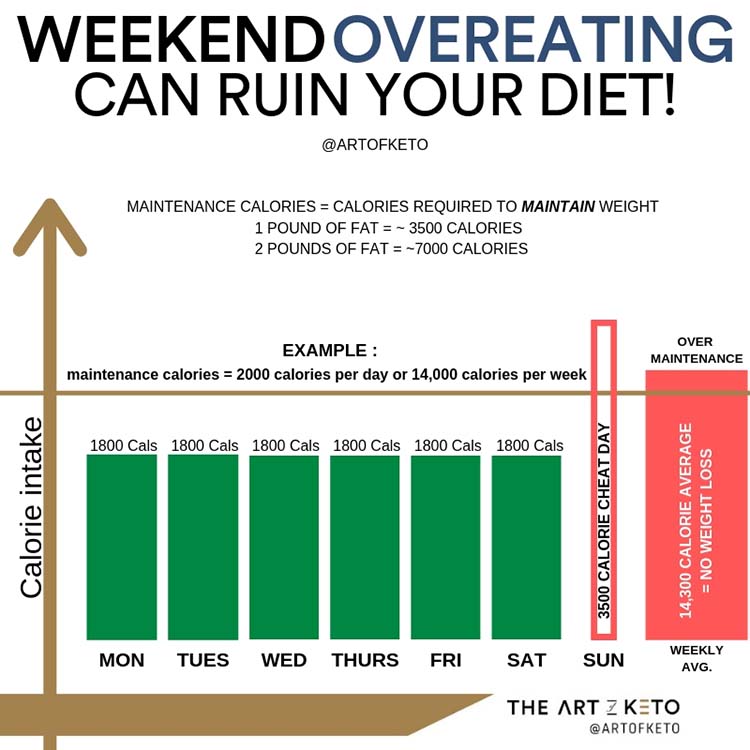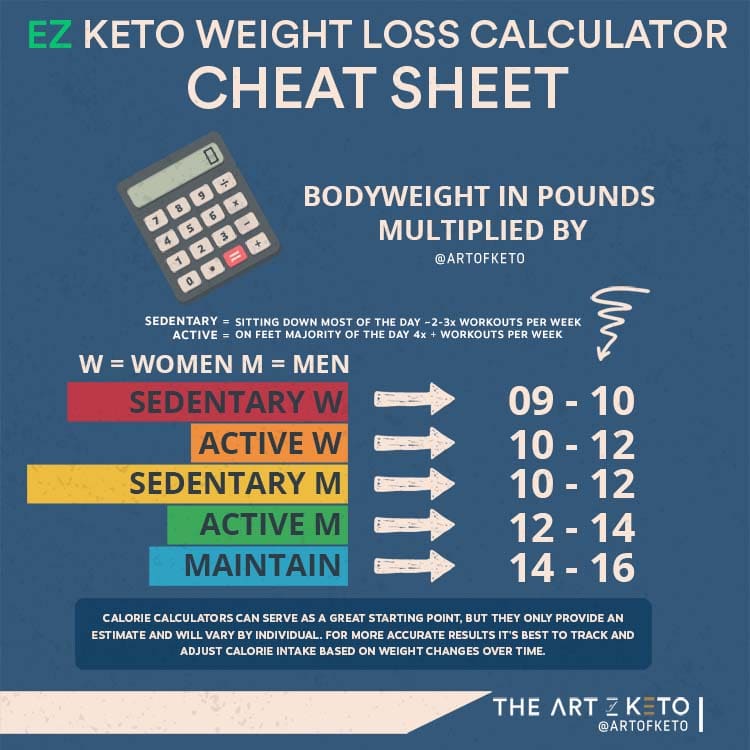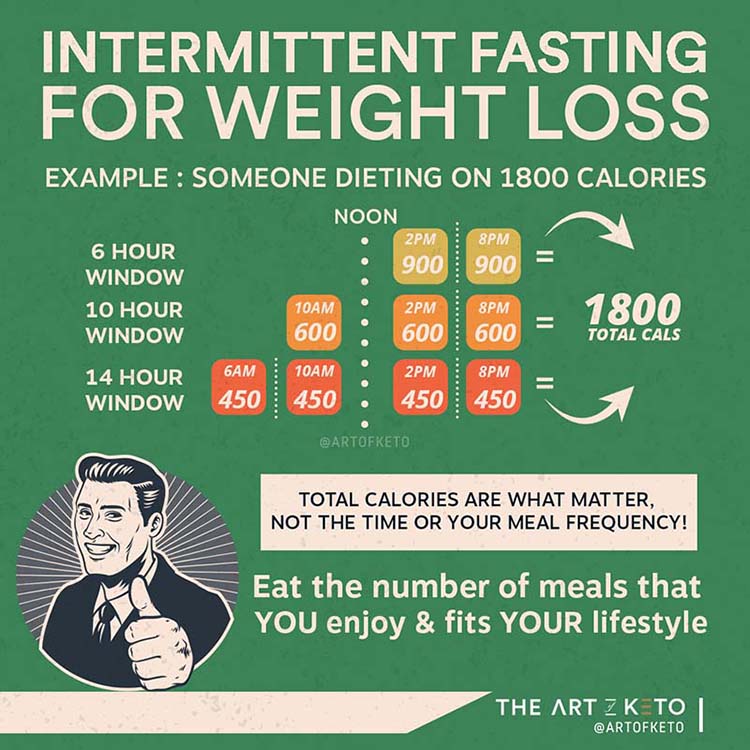I'll admit, the low-carb ketogenic world is an interesting one, especially when it comes to weight loss. People don't seem to think you can overeat on a ketogenic diet and gain weight, but how would you explain the weight gain of those who are intentionally looking to gain weight on a ketogenic diet? Let that sink in for just a second…
It may be more challenging to overeat on a keto diet because many individuals experience less hunger. However, while it is more challenging to eat too many calories on keto, it's not impossible. It is still possible to gain weight while in ketosis if you consume too many calories.
In this article, I'll cover what may lead you to overeat on a ketogenic diet and how to help prevent doing so, whether calories matter and how much you should eat to continue to lose weight.

Table of Contents
Why You May Overeat On Keto?
People use ketogenic diets to gain weight or bulk up and put on muscle. If it was impossible to get fat or gain weight on a ketogenic diet, how can this be explained?
You can most definitely overeat while following a ketogenic diet. However, many people find it hard to overeat on keto due to the increased satiety they experience from eating a low-carb ketogenic diet.
You BLT too much
There are plenty of reasons that you and I eat, besides hunger that is. Sometimes we eat to be social and hang out with friends or coworkers.
Maybe it's somebody's birthday in the office, or there are free snacks in the conference room. Perhaps someone you know asks you to try a bite of this or a bite of that while cooking or in passing.
Whatever the case, all these small bites here and there add up.
I like to refer to these times that you don't sit down for a meal as BLT's, and no, we're not talking about bacon, lettuce, and tomato. When I refer to BLT, we're referring to bites, licks, and tastes.
These are all the small snacks and bites you don't think about, and it's the mindlessness that allows all the little things to add up to something big without thinking twice about it.
If you find yourself not losing weight on keto, but feel as though you're compliant, think if this applies to you. Chances are you may be eating a lot more than you think.
Cheat days or weekends
You're good Monday to Friday, so you decide to reward yourself with a “cheat” meal, or maybe go all out with a cheat day on the weekend. It's not out of the question to think that a single meal or a day of bad eating can wipe out an entire week of progress, but it can.
What's worse is that a “cheat meal” or day can sometimes spiral into multiple meals, days, and all-out binge-fests. Trust me; I've been in this cycle of gluttony and starvation before; it doesn't end well for most people.
While it's ok to go off-plan once in a while, or enjoy a meal without worrying about calories and macros, just remember that it counts, everything counts.

I hate to break the news, but a cheat meal does nothing to speed up your metabolism or trick your body into burning more fat. A cheat meal or day is simply a way to take a mental break from dieting,
What I would recommend instead is to take a “diet break,” or let me rephrase that, a “deficit break.” A diet break isn't a time to revert to your old ways, but a period where you eat more food to give your body and mind a break before continuing.
Think of diet breaks as the pit-stops on a long road trip where you gas up, stretch your legs, rest your dry eyes, and then continue driving.
A pit stop on your road trip allows you to rest, relax, and recharge for another bout of driving. Eventually, you'll get to your destination safe and sound, well-fed, and more relaxed than had you went straight through.
Now, I'm not saying you can't have a cheat day on keto, but if you do… it's not a free for all for 24 hours where everything that happens during that time frame magically doesn't count.
Metabolic adaptation
Most people confuse “starvation mode” for metabolic adaptation. In short, metabolic adaptation is how your body decides to fight back against your attempt to lose weight.
You see, your body doesn't want to lose weight. In fact, through evolution, it was counterproductive to lose weight when it came to survival and reproductive success.
According to the thrifty gene hypothesis, our ancestors developed this ability to stay alive during times of famine. The problem with having this “thrifty gene” is it predisposed us to store a whole bunch of energy reserves (fat) in a world of food abundance.
As you begin to lose weight, you set off a cascade of hormonal signals that signal to your body that it must conserve energy. In addition to energy conservation, your body releases the hormone ghrelin, also referred to as the hunger hormone.
Ghrelin is responsible for sensing long-term energy availability and signaling the brain that additional food isn't necessary. In diet-induced weight loss, ghrelin increases, leading to increased hunger in an attempt to make you eat and re-gain the lost weight.1
Calorie density
A great side-effect of a ketogenic diet is that it causes people to eat less spontaneously. This increased satiety that many experiences on a ketogenic diet are what make keto so useful as a weight-loss tool.
Since diets are notorious for leaving people hangry, in my opinion, any diet that helps manage hunger gives you an advantage.Here's the dilemma when it comes down to a ketogenic diet and calorie density. Most “keto-friendly” foods people are made aware of are high-fat foods.
Out of all the macronutrients, fat has nine calories per gram, while carbohydrates and protein both contain four calories per gram. Meaning, given the same weight or volume of food, a food that is high in fat will have more calories than lower-fat food.
A great example is a cup of bean sprouts, a keto friendly vegetable has only 30 calories, but a cup of peanut butter has over 1,500 calories.
In essence, calorie density is a measure of the calorie content of a given food relative to its weight or volume.
To best demonstrate calorie density by weight, let's take 4 oz. of peanut butter and compare it to 4 oz. of chicken breast. Four ounces of peanut butter will net ~667 calories, while a four-ounce piece of chicken breast gives you ~120 calories.
If you compared both peanut butter and chicken breast by volume, a tablespoon of peanut butter has ~100 calories, while a tablespoon of the chicken breast might have ten calories, just a guess.
On a ketogenic diet, people are led to believe that they MUST eat high-fat foods and keep fat as a high percentage of their diet. The truth is, ketosis can occur with very little to no fat at all.
The ONLY pre-requisite for a ketogenic diet is the reduction or elimination of carbohydrates, not a high-fat intake.A high-fat ketogenic diet was initially developed to prevent epileptic children from having seizures. In cases where there is a neurodegenerative disorder, having high levels of ketones seems to be beneficial for patients.
High-levels of ketones as it relates to fat loss do not correlate. You can show no ketones in your blood or urine and still lose weight, how bout dem' apples?
Opting for leaner cuts of meat and eating more vegetables in place of calorie-dense items from your diet, such as “keto coffee” or fat bombs, is an easy way to help prevent overeating.
Overestimating exercise and underestimating calories
When it comes to losing weight, if you're not actively tracking your exercise and calories, there's a good chance you're either overestimating how much you exercise, how little you eat or a combination of both.23
Meaning, you MIGHT be eating more than you think you are. If you're not losing weight on keto, it's not because you're not eating enough fat or too many carbs, but that you're overeating in general.
Does this mean you have to count every calorie? Not necessarily.
If you develop some good eating habits and have a better awareness of the foods you are eating, how they affect your energy, satiety, and how much energy (calories) they provide, then don't count calories.
The caveat is, many of these are developed by first learning how to count calories. You must first become mindful of what's in many of the foods you like to eat.
I think learning how to track calories and macros is an excellent skill to develop, but not necessary to do it forever.If you're serious about changing your body composition, it will behoove you to learn what a portion size looks like and how many calories are in the foods you generally like to eat.
Do Calories Matter On Keto?
Let's address the elephant in the room. When it comes to weight loss, calories matter, and if you don't believe that… well, then I guess there's no reason to be reading about overeating on keto.
That said, calories ABSOLUTELY do matter on keto and every other “diet” for that matter. Just because calories matter and affect whether you lose weight, maintain weight, or gain weight doesn't mean you have to count calories.
As I've mentioned a few times already, in studies, ketogenic diets cause people to eat less and lose weight spontaneously.
But what does that mean?
In studies where participants were eating as much as they wanted on a ketogenic diet, they naturally felt fuller and ate less, leading to weight loss.4
In a recent study and the longest to date, comparing a low-fat to a low-carb diet showed similar results when it came to weight loss and improved health markers.5
A ketogenic diet isn't for everyone, nor a quick fix. BUT, If a ketogenic diet makes you feel great, and you enjoy the food selection, then keep going.
Just know that calories still matter when it comes to weight loss. If you're not losing weight , maybe even sudden weight gain on keto, then chances are you're overeating and need to either reduce calories, increase your activity levels, or do a combination of both.
Can You Eat Too Little On Keto?
We've established that it's entirely possible to overeat on keto, but is there such a thing as eating too little?
Yes and no.
No, in that there's nothing inherently wrong with eating “too little,” but yes, in the sense that eating too little can affect your weight loss progress in ways you may not have considered.
Increased hunger

Purposely, or even if you're just not hungry on keto, eating too little may lead to increased hunger in the next meals or days. For some, underrating may lead to overcompensation or binge-restrict type eating.
Decreased performance
Undereating can lead to poor performance or poor energy throughout the day. While you may think that eating less will lead to faster weight loss, this isn't always the case.
By eating less, you may not be providing your body with enough energy (calories). In specific individuals, this decrease in food makes them even more sluggish, which can result in stalled or less weight loss.
How is it possible to eat less and lose less weight, you ask?
Well, if you eat too little, your body compensates by making you more tired, which leads to poorer workouts and less movement throughout the day, which results in fewer calories burned.
Walking the tight-rope of dieting fast enough, but not too fast is a constant struggle among dieters.If you're wondering why you're exhausted on keto, it may be merely a matter of underrating.
Muscle loss

When people want to lose “weight,” what they mean is that they want to lose fat for the sake of looking better…
And of course, let's not forget health.
What you might not be taking into account is that weight encompasses everything, including bones, organs, water, and muscle. When you diet, you want to ideally be losing only fat while retaining all of your muscle.
The more muscle you have:
- The better you'll look
- The healthier you'll be
- The more calories you'll burn at rest, lounging on the sofa watching Netflix.
Dieting too aggressively by starving yourself or eating very little food regularly will significantly increase the chance that a portion of the lost weight will also be muscle.
How Much Should You Eat On Keto?
Now that you know that you can also eat too little, how much should you eat?
Rate of loss
You want to be losing weight fast enough that you see progress and stay motivates, but not so quickly that you experience all the downsides mentioned above with aggressive weight loss.
For this reason, I generally like to recommend individuals lose between 0.5 and 1.0% of their total body weight per week. In cases where you may be extremely overweight or obese, losing 1.0 – 2.5% can work without running into the same problems as leaner individuals.
As you lose weight, the rate of weight loss per week should also decrease.
Calculating calories
First, if you have no clue how many calories to eat, head to the keto macro calculator to see approximately how many calories you should be eating according to your goals.
Another super easy method for determining calories is to use the bodyweight multiplier below. While these multipliers are not 100% accurate, they seem to be a great starting point or ballpark for most people.

How much protein
Lastly, when it comes to protein, always err on the side of too much versus too little.6
How much protein on keto is an often debated topic, but many of the arguments are based on the premise of the ketogenic diet for therapeutic uses (Epilepsy, Parkinson's, Alzheimer's).
When utilizing a ketogenic diet for therapeutic reasons, we do want to limit protein intake somewhat, so ketone levels remain elevated. However, when dieting, we want sufficient protein intake to help retain muscle and keep you feeling full and happy as possible.
Protein is not only going to help you maintain muscle while dieting, but the protein will help you with satiety, and it's delicious.I recommend protein intakes of anywhere between 0.8 and 1.2 grams of protein per pound of lean body mass. For the sake of ease, consuming 1 gram of protein per pound of DESIRED bodyweight works as a good starting point.
For example, if you're 190 pounds and want to cut down to 165 pounds, then you would consume 165 grams of protein per day.
If you're worried about taking in too much protein, there was a year-long study conducted with intakes much higher. The study concluded that there were no harmful effects on any health markers, including the liver and kidney.
If you have no pre-existing kidney or liver problems, “high” protein intake is relatively safe.
What's even more interesting about the high protein study is that subjects did not experience an increase in fat mass even though they were technically OVEReating.7
Hungry On Keto? Try These
Lastly, if you still find yourself super hungry on keto, or any diet for that matter, here are a few tips:
The volume of food (less-calorie dense): Eat foods that are lower in calories, but higher in volume and weight. In terms of keto, less calorie-dense foods will tend to be leaner cuts of meat, egg whites in place of some whole eggs, and fibrous vegetables.
One of the mechanisms in which the body induces satiety is through gastric stretching (a full belly). Stretch receptors are activated as it fills with food, but may also work with water as well. Additionally, try drinking a glass of water or two before meals to help with the stretch reflex.
Drink coffee: PLAIN black coffee is a great way to blunt hunger. Are you trying to limit your caffeine intake? Well, even decaffeinated coffee can acutely decrease hunger.8
Notice I said plain black coffee, not keto coffee, not bulletproof coffee, but plain ol' coffee. Adding butter, oil, and whatever else will likely introduce excess calories that could be best spent on food while trying to lose weight. Feel free to sweeten your coffee with a non-calorie sweetener if you prefer.
Intermittent Fasting: A great strategy to eat fewer calories for some is to implement intermittent fasting. Intermittent fasting doesn't inherently burn more fat or fat any faster, but if it allows you to eat less overall, then it's a worthwhile strategy.
Keto and intermittent fasting are often used together in tandem.
If you find yourself not as hungry in the mornings, feel free to skip breakfast. Or, you can implement simple strategies such as moving breakfast an hour later and dinner an hour earlier.
Simple strategies like having a smaller eating window have shown that it causes people to eat less overall by merely adjusting meal times.

The Takeaway
A ketogenic diet is naturally appetite suppressing for many individuals. However, as we begin to lose weight, it's almost inevitable that our body will start to fight back by increasing hunger.
Since calories matter, even on keto, you can still overeat if you're not mindful of what you eat. However, you can prevent overeating by utilizing strategies and habits such as increasing protein intake and intermittent fasting.
Frequently Asked Questions
Is it ok to eat a lot on the keto diet?
A lot of people simple down the keto diet to eating a lot of protein and fat and limiting the carb intake severely. However, it's definitely possible to end up eating too much. Like any diet, keto also relies on ensuring that you're in a calorie deficit.
Can I overeat fat on keto?
It's definitely possible for people to end up eating too much fat on keto. A lot of people also fail to make the distinction between healthy and unhealthy fats.
What happens if you don't eat enough fat on keto?
If you don't eat enough fat on keto and are overloading on protein, the body will enter into a state of limbo. It won't go into ketosis and the body won't break down fats.
